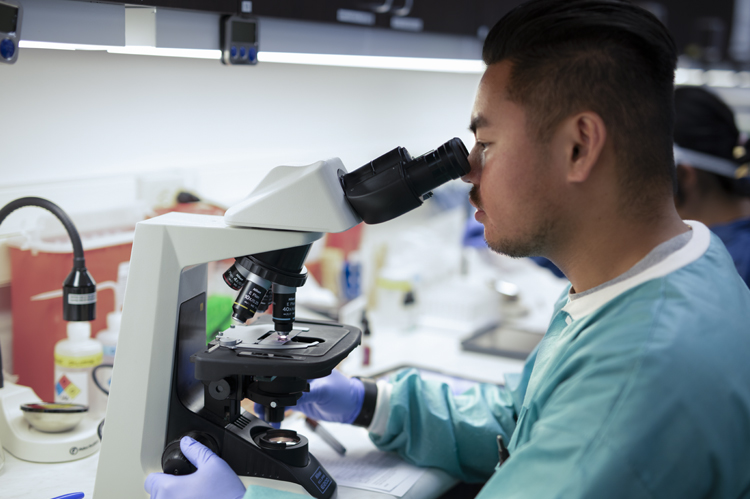Course Descriptions
CLS 200 Phlebotomy and Specimen Management, 1.5 units
Explores topics in Phlebotomy and Specimen Management in a lecture format, including relevant anatomy, physiology, and professionalism with patients. Emphasis will be placed on describing standard operating procedures to collect blood samples for medical laboratory analysis, including technique, equipment, and proper patient preparation. An overview of Specimen Management for the whole program will include topics such as specimen processing, prioritization, and client services.
CLS 201 Clinical Chemistry, 4 units
Explores advanced topics in clinical chemistry in a lecture format. Emphasis will be placed on the pre-analytical considerations, laboratory information systems, principles and methodologies of clinical chemistry analytes, Quality Control (QC) use and interpretation, clinical significance of reference ranges and abnormal results, description of routine and special chemistry testing, therapeutic drug monitoring procedures, tumor markers, and molecular diagnosticsCLS 202 Clinical Hematology, Hemostasis, and Body Fluids, 3 units
Explores advanced topics in clinical hematology, hemostasis, and body fluids in a lecture format. Emphasis will be placed on the functions of the laboratory department, principles and methodologies of automated and manual testing formats, normal and abnormal blood cell production, normal and abnormal body fluids, normal and abnormal hemostatic processes, Quality Control purpose and interpretation, flow cytometry principles, and the correlations of hematological and hemostasis lab results with clinically significant disorders.
CLS 203 Clinical Microbiology, 3 units
Explores advanced topics in clinical microbiology in a lecture format. Emphasis will be placed on the functions of the clinical microbiology department, principles and methodologies of automated and manual tests, identification of normal bacterial flora and pathogens using conventional microbiology procedures, Quality Control purpose and interpretation, principles and interpretation of antimicrobial susceptibility testing, identification of clinically significant viruses and fungal organisms, and pre-analytical considerations in the preparation of blood and non-blood specimens for testing.

CLS 204 Clinical Parasitology, 2 units
Explores advanced topics in clinical parasitology in a lecture format to prepare students for entry-level Clinical Laboratory Scientist skills and competencies. Emphasis will be placed on the function of clinical parasitology, automated and manual testing formats, Quality Control function and interpretation to validate patient results, diagnostic characteristics of clinically significant parasites such as nematodes, cestodes, trematodes, and protozoa, and correlations of parasitic infections with various pathologies and disorders.

CLS 205 Clinical Immunology and Serology, 3 units
Explores advanced topics in clinical immunology and serology, specifically those that include performance of high complexity levels of testing in the department in a lecture format. Emphasis will be placed on the function of the clinical immunology and serology department, antibodies and antigens used in serological testing, adaptive and innate immunity, complement system, basic principles and procedures of serological testing, Quality Control function and interpretation, clinical significance of immune disorders, diagnostic biomarkers, and serological and molecular detection of infectious diseases.
CLS 206 Clinical Immunohematology and Pre-Transfusion Services, 3 units
Explores advanced topics in immunohematology in a lecture format, specifically the pre-transfusion procedures, that include performance of high complexity levels of testing. Emphasis will be placed on the function of the clinical immunohematology and pre-transfusion services, clinically significant blood groups in serological testing, transfusion practice, transfusion-associated disorders, leukocyte antigen and relationship testing, quality and compliance issues.
CLS 207 Clinical Urinalysis 2 units
Explores advanced topics in clinical urinalysis in a lecture format. Emphasis will be placed on the functions of the clinical urinalysis department, the performance of high complexity levels of testing, the clinical significance of microscopic urine sediment, quality control purpose and interpretation, correlation of urinalysis results with disease, and reference ranges obtained in the analysis of extravascular fluids.
CLS 208 Laboratory Management and Education, 3 units
Explores the theory, application, and evaluation of laboratory management principles in healthcare in a lecture format, including safety, research, educational methodology, quality control, ethics, laboratory operations, point-of-care testing, scope of practice, and the job application process. Skills to improve critical thinking, problem-solving, teamwork, communication, professionalism, management, and leadership skills are presented.


 My Canyons
My Canyons  Canvas
Canvas 
